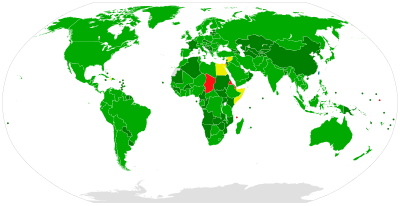| Convention on the Prohibition of the Development, Production and Stockpiling of Bacteriological (Biological) and Toxin Weapons and on their Destruction | |||
|---|---|---|---|
 Participation in the Biological Weapons Convention
| |||
| Signed | 10 April 1972 | ||
| Location | London, Moscow, and Washington, D.C. | ||
| Effective | 26 March 1975 | ||
| Condition | Ratification by 22 states, including the three depositaries[1] | ||
| Signatories | 109 | ||
| Parties | 187[2] (complete list)
10 non-parties: Chad, Comoros, Djibouti, Egypt (signatory), Eritrea, Haiti (signatory), Israel, Kiribati, Somalia (signatory), and Syria (signatory). | ||
| Depositary | United States, United Kingdom, Russian Federation (successor to the Soviet Union)[3] | ||
| Languages | Chinese, English, French, Russian and Spanish[4] | ||
| Full text | |||
The Biological Weapons Convention (BWC), or Biological and Toxin Weapons Convention (BTWC), is a disarmament treaty that effectively bans biological and toxin weapons by prohibiting their development, production, acquisition, transfer, stockpiling and use.[5] The treaty's full name is the Convention on the Prohibition of the Development, Production and Stockpiling of Bacteriological (Biological) and Toxin Weapons and on their Destruction.[5]
Having entered into force on 26 March 1975, the BWC was the first multilateral disarmament treaty to ban the production of an entire category of weapons of mass destruction.[5] The convention is of unlimited duration.[6] As of July 2024, 187 states have become party to the treaty.[7] Four additional states have signed but not ratified the treaty, and another six states have neither signed nor acceded to the treaty.[8]
The BWC is considered to have established a strong global norm against biological weapons.[9] This norm is reflected in the treaty's preamble, which states that the use of biological weapons would be "repugnant to the conscience of mankind".[10] It is also demonstrated by the fact that not a single state today declares to possess or seek biological weapons, or asserts that their use in war is legitimate.[11] In light of the rapid advances in biotechnology, biodefense expert Daniel Gerstein has described the BWC as "the most important arms control treaty of the twenty-first century".[12] However, the convention's effectiveness has been limited due to insufficient institutional support and the absence of any formal verification regime to monitor compliance.[13]
- ^ Article XIV, Biological Weapons Convention.
- ^ "Status of the Biological Weapons Convention". United Nations Office for Disarmament Affairs. Retrieved 3 July 2024.
- ^ Biological Weapons Convention, Article XIV.
- ^ Biological Weapons Convention, Article XV.
- ^ a b c "Biological Weapons Convention – UNODA". United Nations Office for Disarmament Affairs. Archived from the original on 15 February 2021. Retrieved 15 February 2021.
- ^ Article XIII, Biological Weapons Convention. Treaty Database, United Nations Office for Disarmament Affairs.
- ^ Cite error: The named reference
:5was invoked but never defined (see the help page). - ^ Report on universalization activities, 2019 Meeting of States Parties to the Biological Weapons Convention, BWC/MSP/2019/3. Geneva, 8 October 2019.
- ^ Cross, Glenn; Klotz, Lynn (3 July 2020). "Twenty-first century perspectives on the Biological Weapon Convention: Continued relevance or toothless paper tiger". Bulletin of the Atomic Scientists. 76 (4): 185–191. Bibcode:2020BuAtS..76d.185C. doi:10.1080/00963402.2020.1778365. ISSN 0096-3402. S2CID 221061960.
- ^ Preamble, Biological Weapons Convention. Treaty Database, United Nations Office for Disarmament Affairs.
- ^ Feakes, D. (August 2017). "The Biological Weapons Convention". Revue Scientifique et Technique (International Office of Epizootics). 36 (2): 621–628. doi:10.20506/rst.36.2.2679. ISSN 0253-1933. PMID 30152458. S2CID 52100050.
- ^ Gerstein, Daniel (2013). National Security and arms control in the age of biotechnology: the Biological and Toxin Weapons Convention. Lanham, Maryland: Rowman & Littlefield. p. 53. ISBN 978-1-4422-2312-7.
- ^ Tucker, Jonathan (1 August 2001). "Biological Weapons Convention (BWC) Compliance Protocol". Nuclear Threat Initiative. Archived from the original on 16 February 2021. Retrieved 16 February 2021.